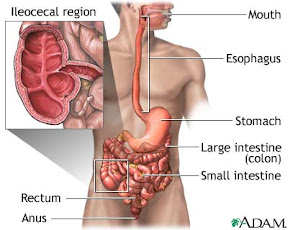In many cases it is initially quite difficult to diagnose Chrons Disease as the symptoms can be quite varied and sometimes the symptoms of Chrons Disease can be confused with Ulcerative Colitis as is what happened in my case.
Chrons disease lasts a long time, sometimes for the rest of the affected person's life and is therefore refered to as a chronic condition. The term chronic refers to time, not to how serious a condition is.
One of the main pointers of Chrons disease is the flare ups of symptoms and then returning to periods of no symptoms at all, which is called remission. In most cases there is no real obvious reason what causes the Chrons disease symptoms to come back (which is called a relapse).
When you have Chrons disease symptoms, the disease is said to be active.
The main symptoms of crohn's disease include the ones listed below but please note are not the only ones:
- Diarrhea which sometimes may contain blood, pus or mucus
- No appetite
- Loss of weight
- A Fever
- Painful and swollen stomach
- Bleeding from the anus
- Tears, ulcers or abscesses (pus-filled areas) around your anus
When the disease is active many people often experience other lesser chrons disease symptoms which include:
- Ulcers in the mouth
- Inflammation of the eyes
- Rashes
- Pain in your joints
- Skin ulcers

